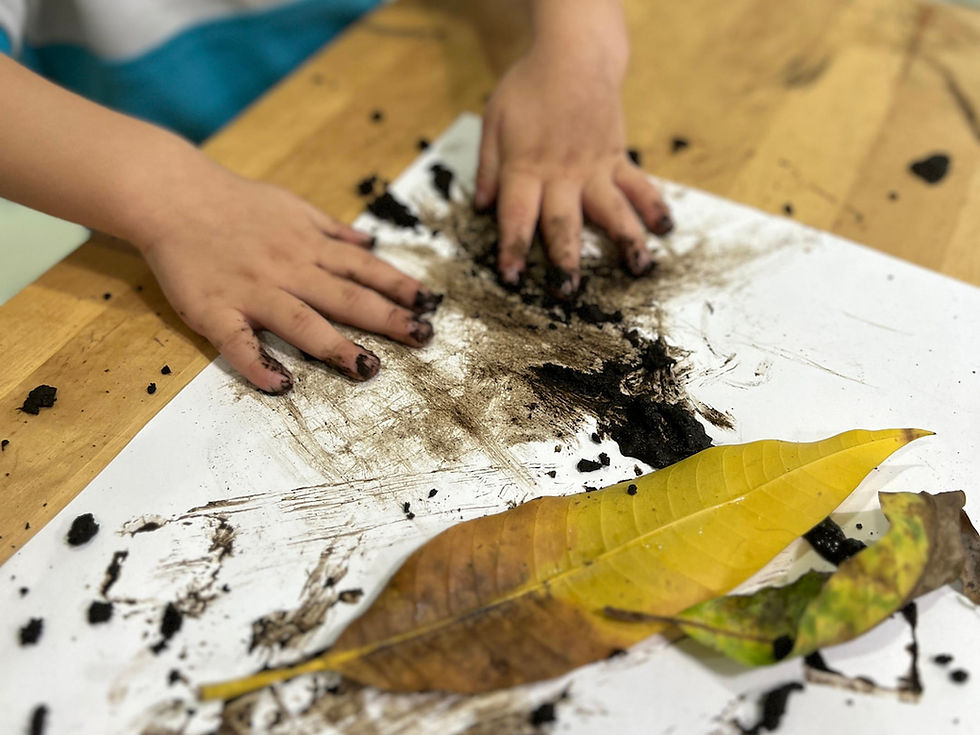My Child Doesn’t Talk Clearly Yet: Should I Worry?
- Marianela de Sousa
- Sep 26, 2025
- 4 min read
A Parent’s Guide to What to Observe and When to Seek Help
One phrase we often hear from parents is:
"I started talking late, too, and I turned out fine."
And yes, sometimes that’s true. But today we know much more about how language develops in early childhood. We now understand that a child’s brain has unique developmental windows, and recognizing certain signs early can make a big difference. So rather than worrying, it’s about observing lovingly, acting calmly, and supporting with the right information.

So rather than worrying, it’s about observing lovingly, acting calmly, and supporting with the right information.
When Does Language Development Begin?
Although it might seem like language begins when a child says their first word, it actually starts much earlier. Even in the womb, a baby’s brain can recognize sounds. In the first months of life, the brain begins forming the neural connections that will be key for speech, understanding, and communication.
Hearing and speech are among the first functions activated in the infant brain. Recent research — like that of Dr. Patricia Kuhl (University of Washington) — shows that even 6-month-old babies respond differently to speech sounds, activating brain areas that will later be used for speaking and understanding.
In other words: language begins to build long before words appear.
What Can I Observe as a Parent?
Here’s a simple chart with some general milestones of language development between the ages of 0 and 3. It’s not meant for comparison, but to give you a general idea of what to look for:
Some general milestones of language development between the ages of 0 and 3
Age | Typical Development Signs |
0–6 months | Babbles, makes sounds, turns when name is called |
6–12 months | Says sounds like “ba-ba” or “ma-ma”, understands familiar words |
12–18 months | Says 5–10 words, points, gestures, follows simple directions |
18–24 months | Uses 20–50 words, combines two words (“mommy water”) |
2–3 years | Makes 2–3 word sentences, asks questions, is at least 50% understood |
3–4 years | Uses full sentences, tells short stories, is at least 75% understood |
(Source: Centers for Disease Control and Prevention – CDC, 2023)
“What If My Child Doesn’t Talk Yet?”
This is when many parents ask:
“Maybe she’s just slow?”
“What if it’s just his personality?”
“Should I wait a little longer?”
If your child doesn't talk "yet", there’s no need to panic. What’s important is to observe carefully — and if you have doubts, seek guidance. Language doesn’t just “turn on” with time. It develops through interaction, relationships, and when needed, with professional support.
We now know that a child’s brain is especially receptive to learning between ages 0 and 5. Acting during that period is far more impactful than waiting. If something is causing you concern, talk to your pediatrician or a speech-language specialist.
Signs It May Be Time to Ask for Guidance
Without labeling or diagnosing, here are some signs worth noticing:
Doesn’t use intentional words by 18 months
Doesn’t point or gesture to request what they want
Doesn’t respond to their name (and it’s not a hearing issue)
Over 2 years old and not combining words
Gets frustrated often when trying to communicate
Has difficulty interacting with children or adults
By age 3, most of what they say is still hard to understand
What You Can Do at Home Every Day
Language isn’t taught with pressure — it grows through everyday connection. Here are a few simple ideas:
Talk while doing things
Name what you see, do, and feel.
Ask open questions
Instead of “Did you like it?”, try “What did you like the most?”
Sing and play with sounds
Kids love rhymes, songs, and silly words.
Read stories daily
Even if they don’t understand everything, hearing words and seeing pictures stimulates their brain.
Listen patiently
Even if they’re not clear yet, encourage them to try and respond enthusiastically.
What If Someone Tells Me “They’ll Talk When They’re Ready”?
It’s true that every child has their own pace.But it’s also true that when something doesn’t flow naturally, we can step in gently and early — instead of waiting for it to pass on its own.
This isn’t about labeling or diagnosing. It’s about acting with love and awareness. Sometimes, just a little professional guidance can help you support your child better.
Who Can I Talk to If I Have Questions?
Your pediatrician, who knows your child’s general development
Their teachers or caregivers, who observe how they interact in groups
A speech-language pathologist, the specialist in communication development
Asking for help doesn’t mean something is wrong. It means you’re being proactive as a parent.
In Summary
Every child develops at their own pace, yes…But there are also signs worth observing.This isn’t about panic — it’s about informed, loving action.Seeking help is part of conscious parenting. And if you’re unsure, ask.
Was This Guide Helpful?
If you know another parent going through this stage, share it.Sometimes, one conversation at the right time can change a child’s path for the better.
Referencias:
Centers for Disease Control and Prevention (CDC). “Developmental Milestones”. https://www.cdc.gov/ncbddd/spanish/actearly/milestones/index.html
Kuhl, P. K. (2010). Brain mechanisms in early language acquisition. Neuron, 67(5), 713–727. https://doi.org/10.1016/j.neuron.2010.08.038
American Academy of Pediatrics. “Language development in early childhood”. www.aap.org






Comments